Tensions between Hollywood’s writers and the major studios and networks had reached their highest levels in years, setting the stage for a possible walkout that could severely disrupt the film and TV industry. Members of the Writers Guild of America voted overwhelmingly April 24 to give their leaders authority to call a strike after their contract expired May 1.
By the early hours of May 2, however, the sides had reached an agreement on a new contract to avert a strike. The contract provides increases to the union’s health plan and improves pay for writers working on short-order TV series -- two chief areas of concern for the guild.
- Share via
Florists, prop houses and other Hollywood vendors shelve austerity plans after WGA strike is averted

Local businesses that cater to film and television production were happily shelving austerity plans on Tuesday after the Writers Guild of America avoided a costly strike.
Businesses including prop houses, florists and transportation firms had been prepared to lay off employees, cut hours of operation or even temporarily close if the WGA couldn’t come to terms with the Alliance of Motion Picture and Television Producers by the Monday deadline.
But the two sides reached a tentative deal for a new film and TV contract for the union’s nearly 13,000 members early on Tuesday morning — a pact that includes gains in minimum pay and increases in contributions to the union’s health plan.
- Share via
Hollywood is relieved after Writers Guild of America reaches deal and avoids a strike
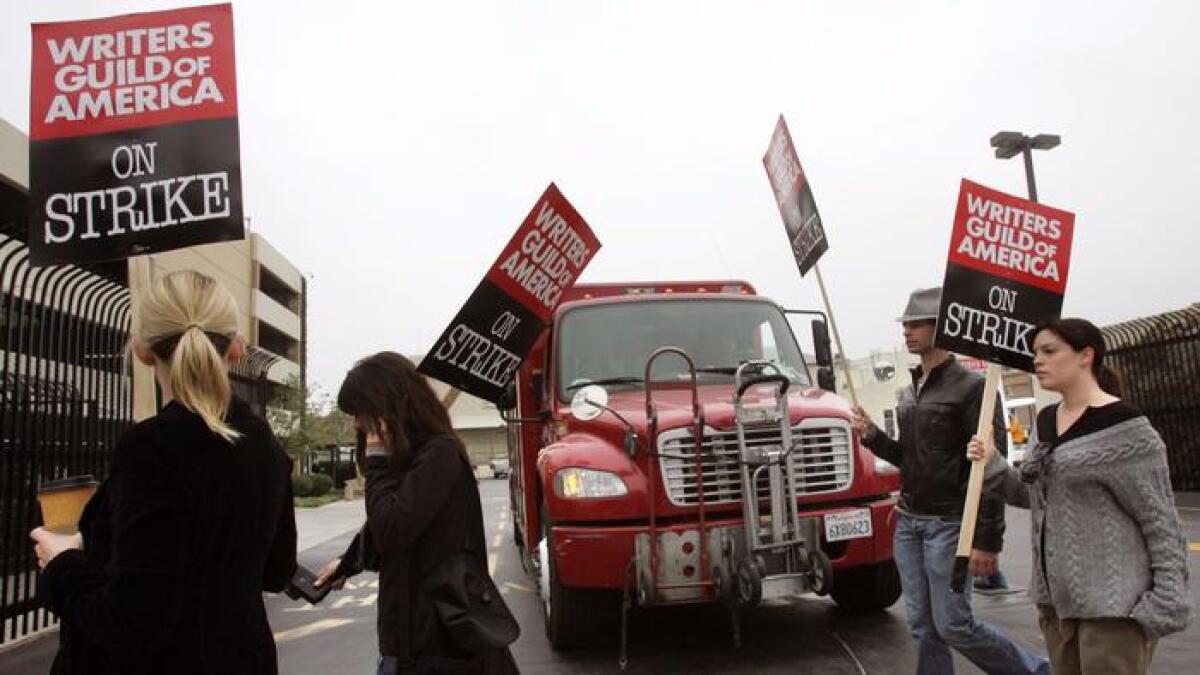
The entertainment industry went back to work as usual on Tuesday after the Writers Guild of America reached a tentative deal in the early morning hours for a new contract with the major Hollywood studios.
Although the deal still has to be ratified by guild members, the possibility of a strike now sits squarely in the past, much to the relief of those in Hollywood who feared the specter of a work stoppage that would have had widespread impact throughout the business.
- Share via
Strike averted: Writers Guild of America reaches agreement with studios
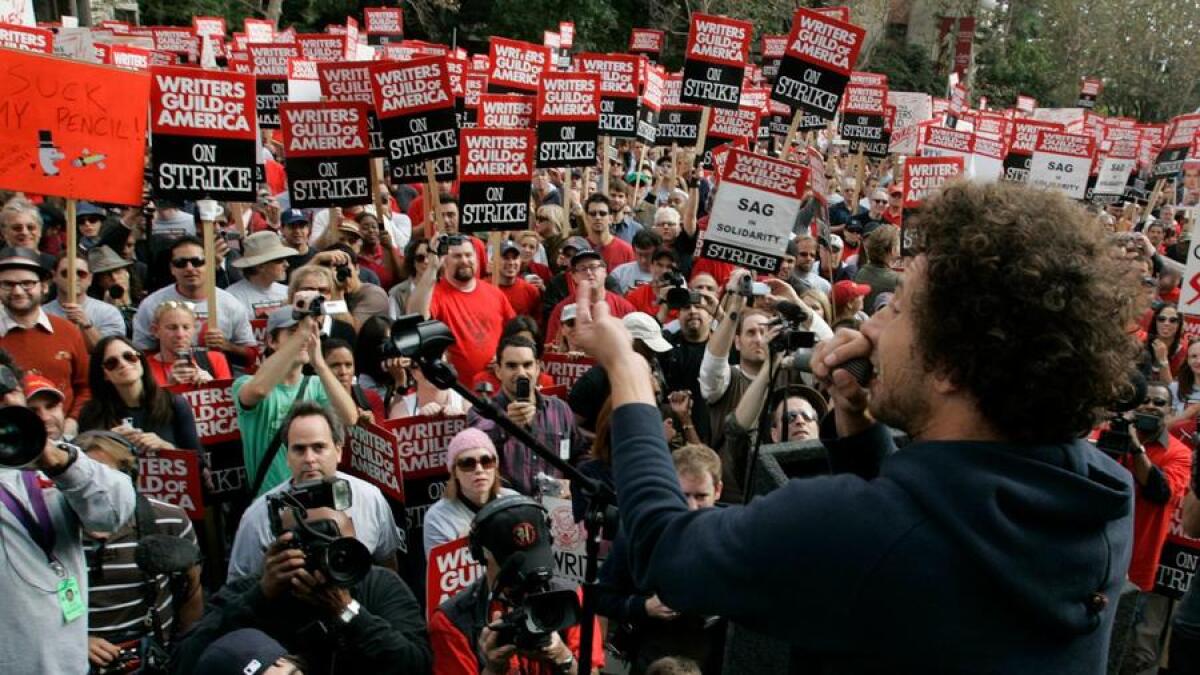
Hollywood can finally breathe a sigh of relief.
The Writers Guild of America early Tuesday morning reached a deal with the major studios and networks for a new film and TV contract.
“It came right down to the wire,” said one person close to the talks who was not authorized to comment. “We didn’t get everything we wanted and they didn’t get everything they wanted, which is usually the result of a successful negotiation. We made real and substantial gains for writers in a number of areas.”
- Share via
Negotiations between WGA and studios have stalled as strike deadline nears
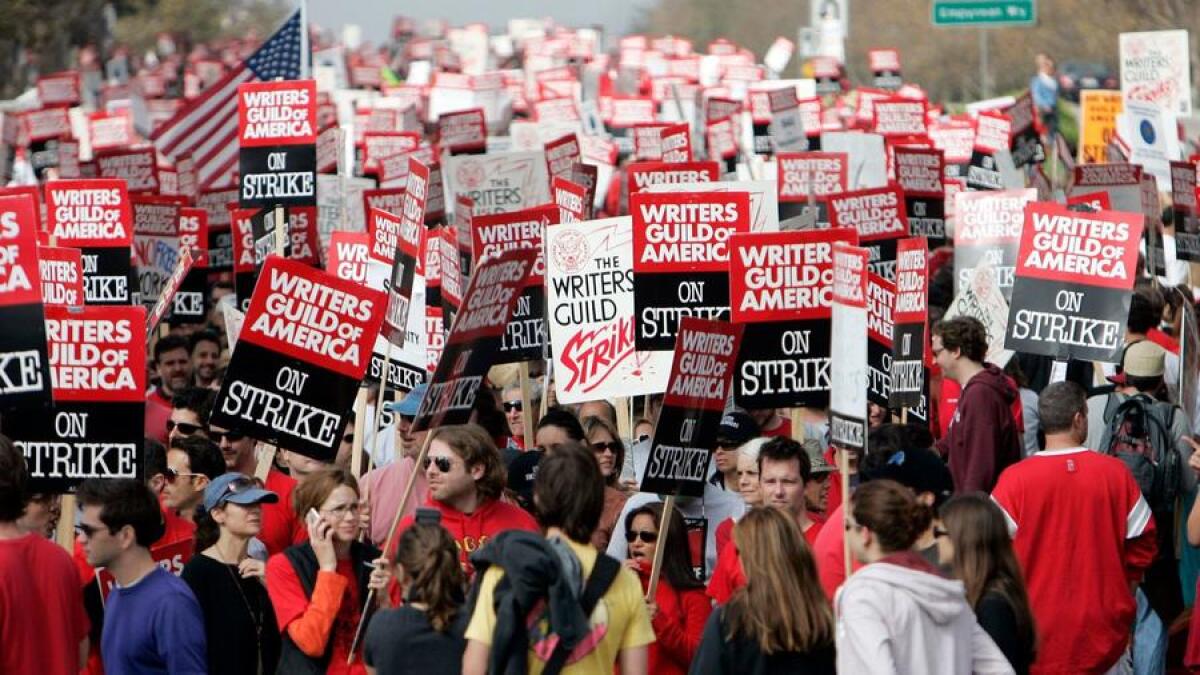
In classic Hollywood fashion, the negotiations between the Writers Guild of America and the major studios are looking to be a suspenseful nail-biter.
Talks between the two sides appear to have stalled Monday evening as the midnight deadline approaches without any announcement about a deal.
Although the writers and the studios seemed to have made some progress over the weekend on several issues, including the guild’s healthcare plan, writers had not responded to the studio’s latest offer well past the noon Monday, according to sources familiar with the discussions who weren’t authorized to talk to the media.
The mood within the guild appears to be grim as optimism has given way to trepidation over the possibility of a strike that would have far-reaching impact across Hollywood.
If the two sides fail to reach a deal by midnight, they could still avert a strike if they agree to extend the deadline. A federal negotiator could also be called if the discussions deteriorate further.
The guild is negotiating with the Alliance of Motion Picture and Television Producers, the body that represents the major Hollywood studios and networks. Both sides have been unable to comment because of a media blackout.
On Sunday, the alliance increased its offer on the guild’s health plan, which faces mounting deficits, according to one source. The studios also improved their offers on other sticking points, like the trend toward shorter TV seasons that has hurt writers’ pay.
- Share via
Writers Guild of America and studios appear to make progress in negotiations as strike deadline looms
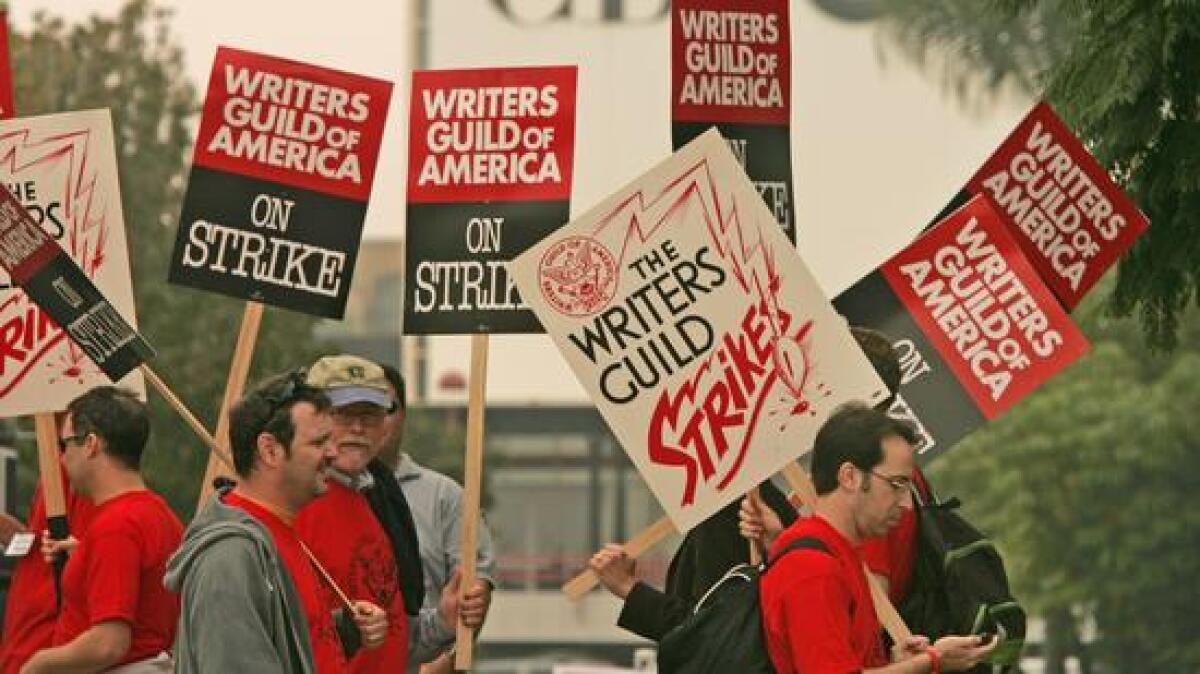
The Writers Guild of America and the major studios appeared Sunday to be moving closer toward a deal that would avert a strike, with the studios increasing their offers on several contentious issues, including the writers’ health fund.
But no deal has been announced so far and a strike could still happen if both sides fail to reach an agreement by midnight Monday, when the writers’ current contract expires. A strike would affect nearly 13,000 film and TV writers and would cause widespread disruption in Hollywood.
- Share via
‘There are people who depend on this machine to keep running,’ says writer-actor Justin Theroux

Actors Laura Dern from “Big Little Lies,” Justin Theroux from “The Leftovers,” Regina King from “American Crime” and Milo Ventimiglia from “This Is Us” discuss the possible upcoming writers’ strike during a Los Angeles Times Emmy Roundtable on April
Justin Theroux was in the throes of production on the big-screen comedy “Tropic Thunder” during the lead-up to the writers’ strike of 2007-08.
“I remember doing a blistering three days — coming up to the [last] writers’ strike — trying to get these sort of [alternative] jokes and different changes in to submit them, so we could finish our shooting of the film,” said Theroux, who co-wrote the comedy that starred Ben Stiller and Robert Downey Jr.
“That being said,” he added, “strikes are devastating to an industry. You have to remember, crews who work on a week-to-week basis — or paycheck-to-paycheck, some people — it’s really devastating to them.”
Theroux, who currently stars in HBO’s “The Leftovers” and whose other writing credits include “Iron Man 2” and “Zoolander 2,” shared his views on the possible writers’ strike that could hit Hollywood in a matter of days. The conversation — which also included Regina King (“American Crime”), Laura Dern (“Big Little Lies”) and Milo Ventimiglia (“This Is Us”) — took place as part of The Envelope’s TV drama roundtable.
The actors spoke of their hopes for a resolution between the Writers Guild of America and the studios, the ripple effects of a potential work stoppage, and the impact technology has had on the industry — a matter they, too, continue to contend with as SAG-AFTRA negotiations for a new master contract begin later next month.
“It’s about appropriate respect,” Dern said. “It’s not even about really making money.”
For more on the conversation, watch the clip above.
- Share via
A gold-plated healthcare plan lies at the center of a dispute between writers and major studios
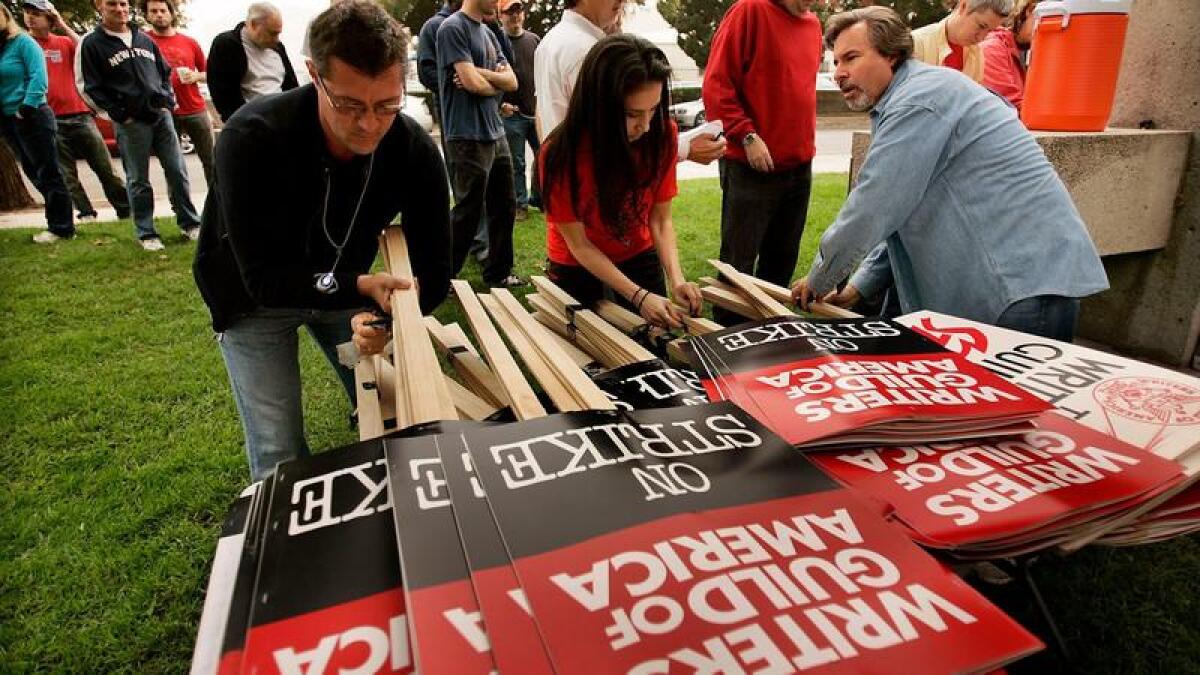
When Hollywood writers went on strike in 1973, they were agitating for something new -- the creation of a health plan that would offer comprehensive coverage for its guild members.
Since then, the writers’ insurance plan has grown to become one of the most envied in Hollywood. Members don’t pay monthly premiums and have deductibles far below the national average. Writers have access to a wide network of care providers, including top-notch facilities in Los Angeles where patients are responsible only for co-pays.
As writers and studios work to avoid a strike ahead of Monday’s contract deadline, the guild’s employer-funded health plan has emerged as a major bone of contention.
Like many plans, it faces spiraling costs and declining reserves. The negotiations come amid heightened healthcare anxiety nationwide as President Trump fights with Congress over his promise to repeal and replace Obamacare.
- Share via
‘A firm stance is required,’ says ‘The Office’ TV writer Mike Schur
With negotiations to avert a Hollywood writers’ strike stretching into the final days, Mike Schur, one of TV’s funniest and most incisive writers, said an entertainment industry increasingly defined by streaming, shorter seasons and corporate profits have put mounting pressure on writers.
Schur, whose credits include “The Office,” “Parks and Recreation” and creator of NBC’s “The Good Place,” answered a few questions regarding a possible strike, the Internet and the writing life in Hollywood.
Would you explain why you do or do not support a strike?
I support, unconditionally, reasonable demands made by any labor force in America. The fact that the management in this case has done so absurdly well in the last 15 or so years only makes the support that much easier. Like many writers, especially comedy writers, I tend to be conflict averse. But when the requests are so plainly justifiable, a firm stance is required, for the future health of the union and the industry as a whole.
The television landscape has shifted much in recent years. What are some of the more dramatic changes you’ve seen that directly affect TV writers?
The entire business seems to change every year, and change that rapid always benefits the giant companies more than the hired help. Seasons are getting shorter, residuals are disappearing, budgets shrinking, writing staffs are being pared down... At a time when there is more work than ever you’d think the writers (and actors, and directors) would be in the catbird seat, but we’re not. We’re all scrambling to figure out how the system works now, and how it will work in six months, or a year.
In 2007-08, the media companies were claiming there was no money in streaming and online content, so we should work for free (basically) until they could get a handle on what it was worth. The WGA thought that was a disingenuous stance... so we struck, and because of that everyone who now writes for Netflix and Hulu and Amazon gets guild coverage. That was an enormous victory. We need more victories like that.
You’ve enjoyed success. But there’s a misconception about TV writers; that they’re all secure and well off. That’s not reality, correct?
Yes -- there are a handful of Shonda Rhimeses and Aaron Sorkins, and then thousands of low-level or unemployed members who rely on the union’s established minimums and residuals to get by. A union’s job is to raise the floor and protect its most vulnerable members, and I believe the job of the union’s most successful members is to support that objective wholeheartedly.
I would also add that the material wealth of the average WGA member is somewhat immaterial... The money we are asking for... is being earned by six people at one company in one year. That’s bonkers, to me.
- Share via
No picketing for Pixar? Why a writers’ strike won’t hobble animation studios
Don’t expect Buzz Lightyear, Elsa or Toothless the dragon to go on strike next week.
As Hollywood makes contingency plans for the possibility of another writers’ walkout, the major animation studios — including Walt Disney Animation, Pixar Animation and DreamWorks Animation — have little reason to sweat. Same goes for cartoon-heavy cable programmers such as Nickelodeon.
That’s because scribes for those studios are not subject to the Writers Guild of America contracts that govern other movies and television shows. Instead, most animated film and TV writing falls within the reach of the Animation Guild, which is part of the International Alliance of Theatrical Stage Employees, which is not threatening to hit the picket lines. And some studios, such as Disney-owned Pixar, aren’t signatories to any union.
- Share via
Showrunners behind ‘Better Call Saul,’ ‘Veep’ and more talk possible writers’ strike
In less than a week, writers’ rooms across Hollywood will go dark if the Writers Guild of America goes on strike.
For showrunners on some of TV’s most talked-about series, the focus is on crafting stories while they can.
“We’re just keeping our heads down and working until they tell us we can’t,” said Gloria Calderon Kellett, co-showrunner of Netflix’s “One Day at a Time.” Writers for the series recently started work on Season 2.
Kellett was part of The Envelope’s showrunner roundtable, alongside Bruce Miller (“The Handmaid’s Tale), Peter Gould (“Better Call Saul”), Aziz Ansari (“Master of None”) and David Mandel (“Veep”).
Miller, who opened up “The Handmaid’s Tale” room earlier this week to begin work on Season 2, said there’s no mad dash to churn out copy before Tuesday, when a strike would begin.
“It doesn’t change what you’re doing in terms of figuring out the story,” Miller said. “We go as quickly as we can anyway. You don’t want to [work] too quickly, because then you just write crappy stuff. It really doesn’t change anything.”
They just hope the guild and the Alliance of Motion Picture and Television Producers can reach an agreement.
“I voted yes,” Mandel said, referring to the recent strike authorization vote, “but boy, I really don’t want there to be a strike.”
Gould added: “It’s not really up to us. It’s up to the companies to do what’s right. There’s not a lot more to say than that.”
The last writers’ strike in 2007-08 lasted 100 days. And while it wasn’t what they wanted then, either, many writers enjoyed the opportunity to meet and talk with their peers in the process.
At the time, Gould was working on “Breaking Bad,” whose season was cut short because of the strike. He left Albuquerque, N.M., just as an episode he had written was in the prepping stages.
“I was on the picket line and people would say, ‘What show are you on?’” Gould recalled. “And I’d be like, ‘it’s this thing called ‘Breaking Bad.’ They’re shooting my episode right now.’”
“But I also remember being on the picket line and being very entertained by Dana Gould [of ‘The Simpsons’], who is no relation but is one of the funniest people around. Dana kept a whole group of us on Lankershim [Boulevard] entertained for days on end. All I could say is, I hope, if it comes to that, that I am stationed wherever he is cause he’s a lot of fun.”
Miller’s silver lining while marching outside of Universal’s lot involved the TV series “Battlestar Galactica.”
“I hadn’t watched ‘Battlestar Galactica,’ and it turned out the people on ‘Battlestar’ were [picketing where I was]. I would go home at night, watch one episode, and then I’d find the writer and get like DVD commentary all day long,” Miller said. “Every writer, if you walk up to them on a picket line and say, ‘Hey could we talk about your episode for 4 hours,’ they were in heaven. And it was great. It was so much fun, for me, because you could just ask them a million questions. It made the time go by.”
- Share via
NBCUniversal CEO Steve Burke says he’s optimistic a writers’ strike can be averted
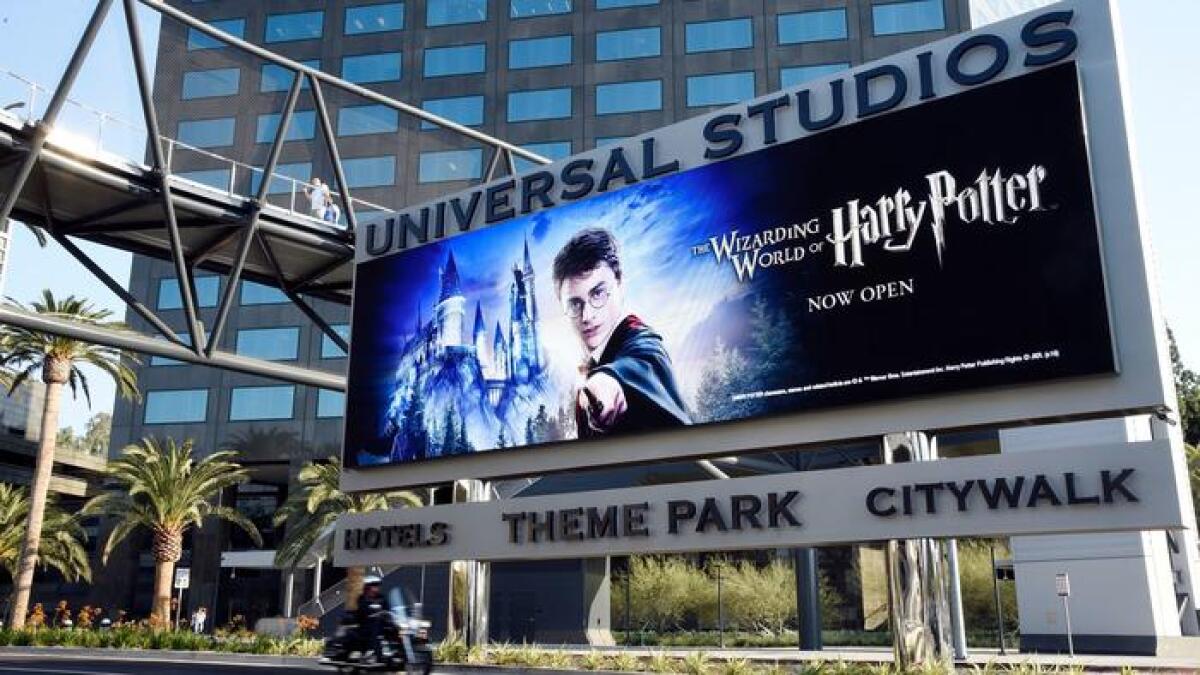
NBCUniversal Chief Executive Steve Burke waded into the delicate topic of a looming writers’ strike.
The Writers Guild of America has received a strike authorization vote from members who are just days from a possible walkout that would disrupt TV and film productions nationwide. That prospect has raised concern on Wall Street about the potential financial impact on media companies, including NBCUniversal.
But in a call with analysts Thursday, Burke expressed hope that a last-minute deal could be reached and a strike avoided.
“Strikes aren’t good for anybody,” Burke said in an earnings call Thursday morning, adding that he was optimistic a deal would be reached. “I’m hopeful we’re going to get it done.”
- Share via
L.A. businesses brace for writers’ strike. One car lot is auctioning a third of its showbiz vehicles
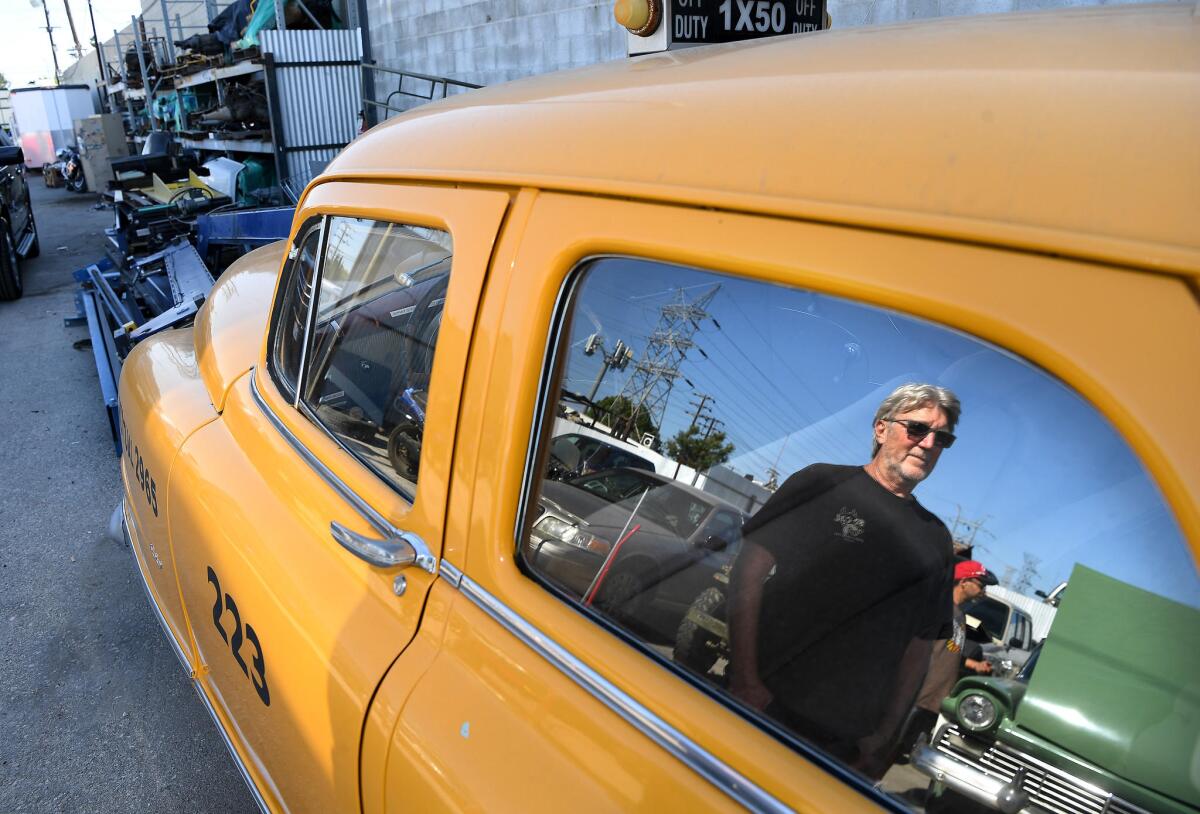
Hundreds of cars are crammed onto Picture Car Warehouse’s dusty lot in Northridge, a horde as diverse as the films and TV shows they’ve appeared in over the years.
There’s a 2008 Smart Car that was in the TV show “Two and a Half Men,” its windshield caked with a thin layer of grime. A 1964 Lincoln Continental limousine gleams in the afternoon sun, the sparkly blue paint bearing the Bud Light logo for a recent Super Bowl commercial. And near the entrance, a loafing 1948 Dodge panel truck from the film “Hail, Caesar!” sits on improbably small white-wall tires.
If all goes as planned, each will be sold at an online auction that ends Thursday.
Ted Moser, whose Picture Car Warehouse rents vehicles to film and TV productions, said he decided a few months ago to auction off about 200 of his 600-car fleet partly to cull his inventory. But there is another, more pressing reason: Moser is worried about a potential strike by the Writers Guild of America.
- Share via
A strike by TV and movie writers may be just days away. Here’s what you need to know
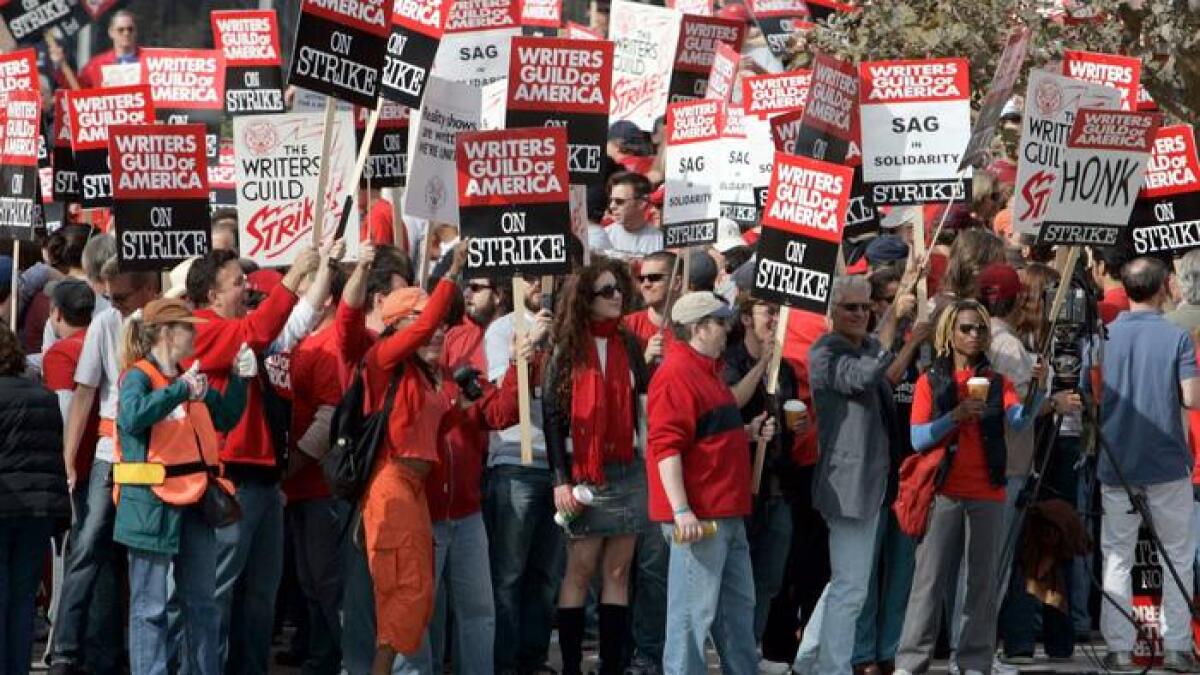
Ready or not, Hollywood may be thrust into another writers strike in less than a week.
A decade after the previous walkout that lasted 100 days, film and TV executives are once again bracing for a strike that could roil the business and Los Angeles’ bedrock entertainment industry. The ripple effect of a walkout is expected to touch all aspects of Hollywood, from the corporate suites to film sets in far-flung locations.
Here’s a primer on what you need to know about a possible work stoppage.
- Share via
Writers Guild of America members authorize strike as contract deadline looms
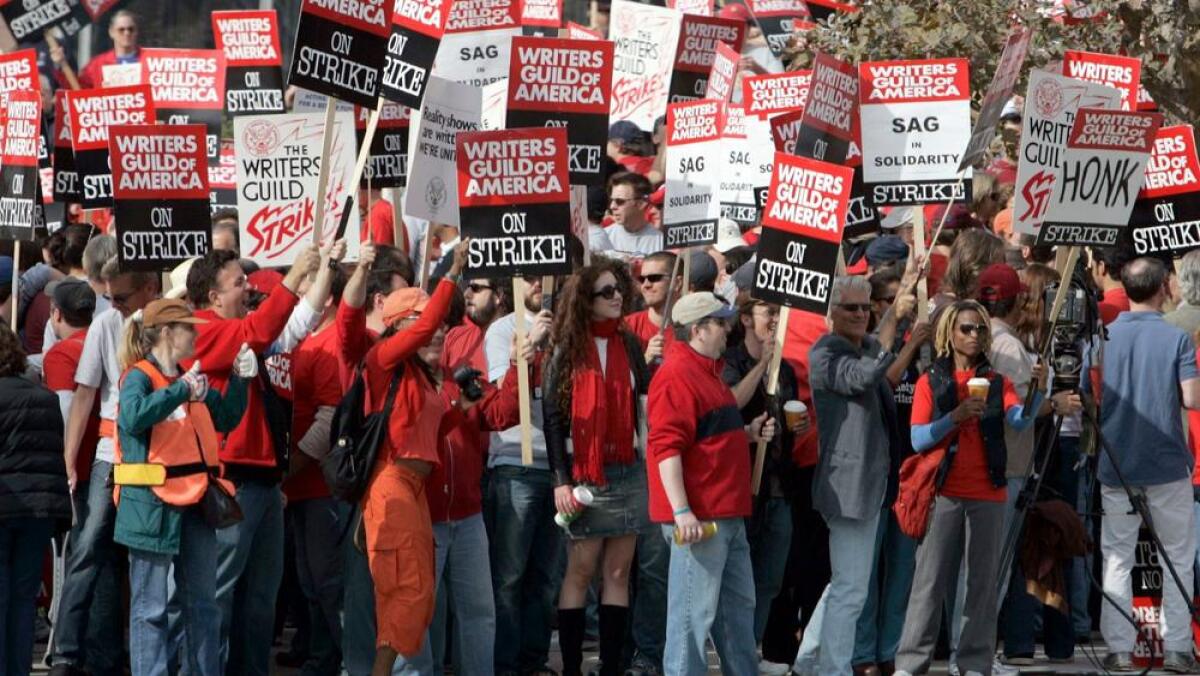
In a sign of rising labor tensions in Hollywood, members of the Writers Guild of America voted overwhelmingly Monday to authorize a strike just a week before the union’s contract is set to expire May 1.
Although the vote is largely seen as a negotiating tactic to put pressure on the studios, it moves the union one step closer to a work stoppage that would have widespread repercussions throughout the film and TV industry.
The guild said 96.3% of the 6,310 writers who cast ballots voted in favor of the measure, which gives leaders the authority to call a strike if negotiations fail. The union said 67.5% of eligible WGA members voted. The union has nearly 13,000 members.
During the last writers’ walkout in 2007, members voted 90% in favor of granting a strike authorization.
Though a strike authorization was widely anticipated, the near unanimous support from guild members could give negotiators more leverage in talks with the major studios.
A strike could still be avoided if the two sides reach an agreement by the deadline next week.
- Share via
Opinion: I voted for a Hollywood writers’ strike, but I don’t want one
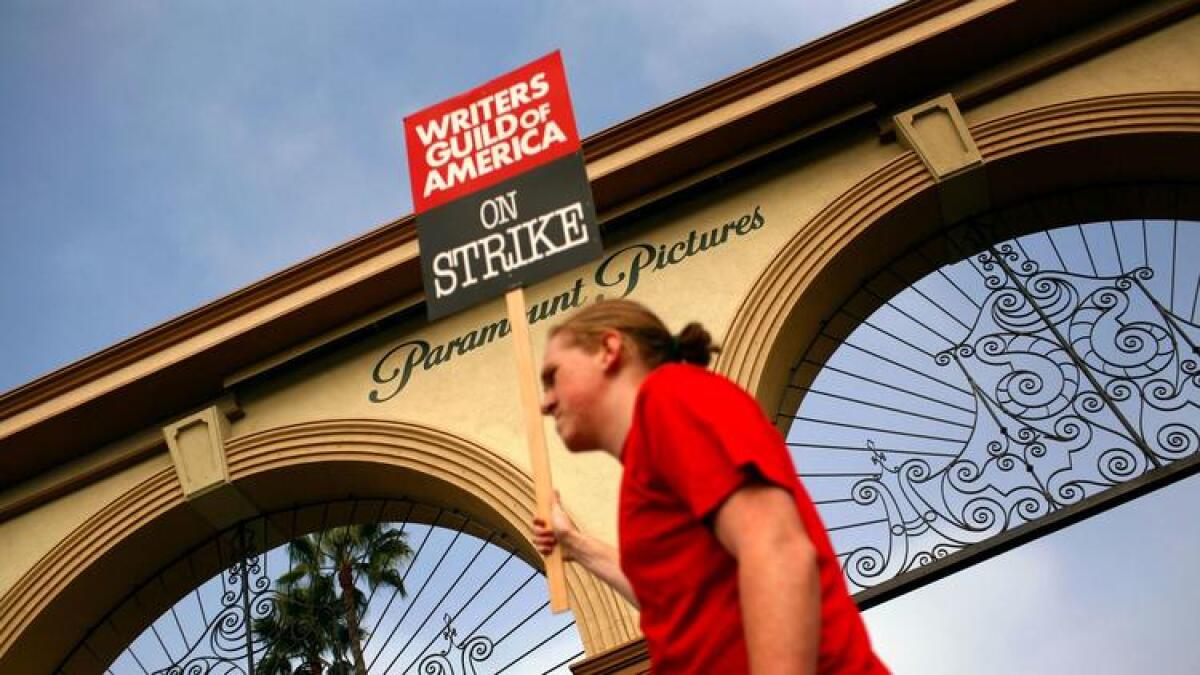
John Eisendrath, a television writer and executive producer of “The Blacklist,” explains why he voted in favor of a strike authorization sought by leaders of the Writers Guild of America.
- Share via
Hollywood scrambles to keep the show going as strike threat looms
“This just kind of sneaked up on us,” one programming executive said.
That sums up the reaction among many network TV and film studio executives who have been caught off guard by the escalating conflict with the Writers Guild of America.
They have been scrambling to prepare contingency plans for a strike, including delaying the premieres of scripted TV shows and brushing up scripts for movies nearing production.
- Share via
Why this era of ‘peak TV’ may not be so great for writers
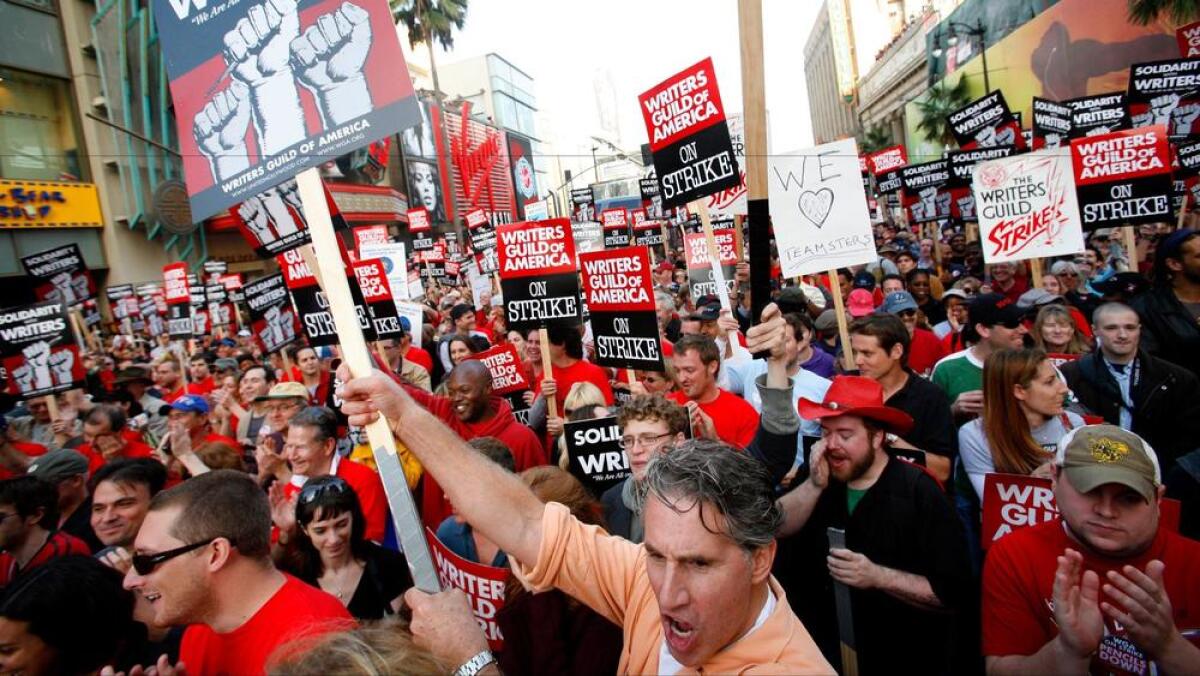
This may be an era of “peak TV,” with an unprecedented number of quality series being produced.
But many writers in Hollywood contend that the booming television business has left them behind and that they aren’t being fairly compensated.
The rise of shorter TV seasons is one of the main points of friction in the contract dispute between writers and major TV producers.